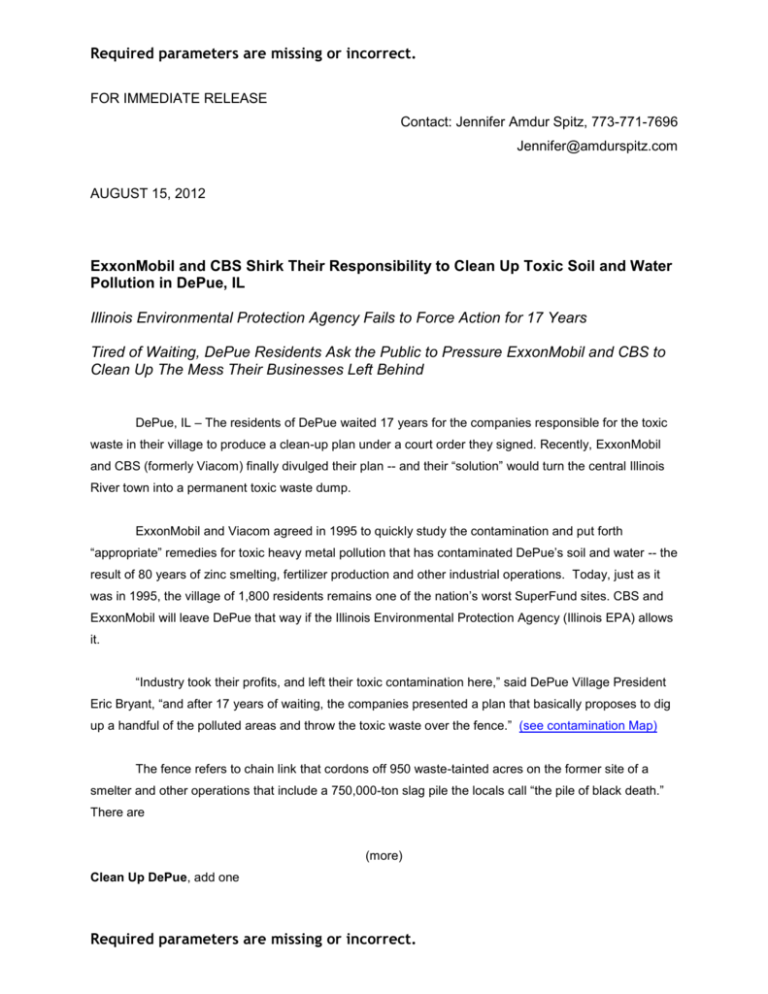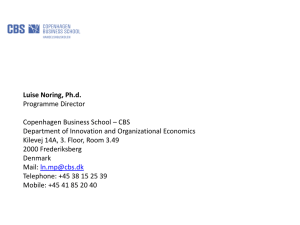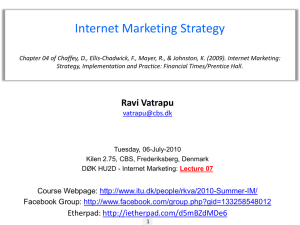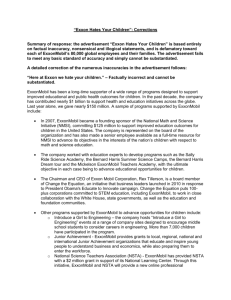Press Release, dated August 15, 2012
advertisement

Required parameters are missing or incorrect. FOR IMMEDIATE RELEASE Contact: Jennifer Amdur Spitz, 773-771-7696 Jennifer@amdurspitz.com AUGUST 15, 2012 ExxonMobil and CBS Shirk Their Responsibility to Clean Up Toxic Soil and Water Pollution in DePue, IL Illinois Environmental Protection Agency Fails to Force Action for 17 Years Tired of Waiting, DePue Residents Ask the Public to Pressure ExxonMobil and CBS to Clean Up The Mess Their Businesses Left Behind DePue, IL – The residents of DePue waited 17 years for the companies responsible for the toxic waste in their village to produce a clean-up plan under a court order they signed. Recently, ExxonMobil and CBS (formerly Viacom) finally divulged their plan -- and their “solution” would turn the central Illinois River town into a permanent toxic waste dump. ExxonMobil and Viacom agreed in 1995 to quickly study the contamination and put forth “appropriate” remedies for toxic heavy metal pollution that has contaminated DePue’s soil and water -- the result of 80 years of zinc smelting, fertilizer production and other industrial operations. Today, just as it was in 1995, the village of 1,800 residents remains one of the nation’s worst SuperFund sites. CBS and ExxonMobil will leave DePue that way if the Illinois Environmental Protection Agency (Illinois EPA) allows it. “Industry took their profits, and left their toxic contamination here,” said DePue Village President Eric Bryant, “and after 17 years of waiting, the companies presented a plan that basically proposes to dig up a handful of the polluted areas and throw the toxic waste over the fence.” (see contamination Map) The fence refers to chain link that cordons off 950 waste-tainted acres on the former site of a smelter and other operations that include a 750,000-ton slag pile the locals call “the pile of black death.” There are (more) Clean Up DePue, add one Required parameters are missing or incorrect. Required parameters are missing or incorrect. also ridges, made of 250,000 tons of toxic waste from paint-making operations and the remnants of years of manufacturing sulfuric acid left by New Jersey Zinc, a company acquired by Viacom and later acquired by CBS. Another fence surrounds a phosphogypsum stack, left by Mobile Chemical and now owned by ExxonMobil. The slag and waste left behind continue to leach heavy metals and carcinogens into ground water that runs off into Lake DePue, which flows directly into the Illinois River. Contaminated debris blows onto public and private property throughout the village and surrounding natural areas, exposing residents -more than a quarter of whom are children under the age of 16 -- and local wildlife to arsenic and heavy metals such as lead, mercury and cadmium. Visit www.CleanUpDePue.org to see an interactive map that details the way-above-normal concentrations of pollutants at hundreds of contaminated sites. These small-town, mainly working-class Americans, have also been exposed to years of corporate foot- dragging, and until now, Illinois EPA has let them get away with it. "Illinois EPA has had the responsibility for oversight, and for most of that time, the Illinois EPA did little to force ExxonMobil and CBS to fulfill this order. Now, with a new Illinois EPA administration pushing them finally to meet the requirements of the Consent Order, ExxonMobil and CBS are continuing to minimize the risks to human health and the environment and to set the groundwork for leaving the contaminated waste where it is,” said Nancy Loeb, director of the Environmental Advocacy Clinic at Northwestern University School of Law’s Bluhm Legal Clinic and pro-bono counsel for the Village of DePue. Loeb continued, “The companies spent millions of dollars on consultants in an attempt to show that this SuperFund site poses no significant risks, and they delivered a superficial plan that barely touches many of the contaminated areas, leaves the slag pile and other waste in place, does nothing to stop contamination from seeping into the groundwater, and leaves backyards, playgrounds and Lake DePue without real remediation.” Loeb also criticized CBS and ExxonMobil for their totally unrealistic methods for looking at risk. “In determining whether a person is exposed to potentially harmful levels of toxic pollutants, CBS and ExxonMobil are counting each exposure as if it were an isolated incident, and pretending that residents are exposed only to a single contaminant and only in one area of the town. The reality is that children are (more) Clean Up DePue, Add two growing up here, eating from home gardens, playing in parks and ball fields, boating in the lake, and later Required parameters are missing or incorrect. Required parameters are missing or incorrect. working and living as adults in DePue. Any realistic assessment of health risks has to take these multiple, constant and long-term exposures into account.” “I feel like the victim again,” said DePue resident Jesus Torres at the Community Advisory Group meeting, convened under the Super Fund process. “The consent order required the responsible parties to come up with the plan, supervised by the Illinois EPA. I don’t know how to respond to that plan. It’s not even close to what’s needed.” “People here are tired of ExxonMobil and CBS earning record profits while jeopardizing the health and well-being of the children, families and wildlife in DePue,” said Keith Garcia, a science teacher at DePue High School who had his class sample soil and water to document unsafe concentrations of pollutants. ExxonMobil earned almost $16 billion in profit second quarter 2012.. A full clean up of DePue might cost as much as $500 million – still under three days’ profit for this company. “We want everyone to know what ExxonMobil and CBS are doing,” said Adeline Gavina, a DePue High School student. Together with chemistry students from Northwestern University and Groundswell Educational Films, DePue students built a website with a virtual tour of their town and the interactive map. The map shows the location for 1,976 samples taken by the companies over the past several years, exactly which contaminants were found in each sample, and the health risks of residents’ prolonged exposure to these contaminants. The website and map were built under grants from the Initiative for Sustainability and Energy at Northwestern (ISEN) and the Environmental Chemical Sciences Program of the National Science Foundation's Division of Chemistry, Northwestern University Chemistry student interns worked over six month to analyze, interpret, and enter the data that you see on the map." “We are raising awareness, and raising funds so we can hire experts to reply to ExxonMobil and CBS’s faulty science,” said Bryant, the village president. “We also need Illinois EPA to hold their feet to the fire.” The Village of DePue demands that ExxonMobil and CBS fulfill their obligation and clean up the lake and the rest of the town. Here’s how people can help DePue and its residents: - Sign the Clean Up DePue petition - Forward our videos and website to your friends and share on social media - Make a donation to the Clean Up Lake DePue Fund (donations are tax deductible) ##### Required parameters are missing or incorrect.







